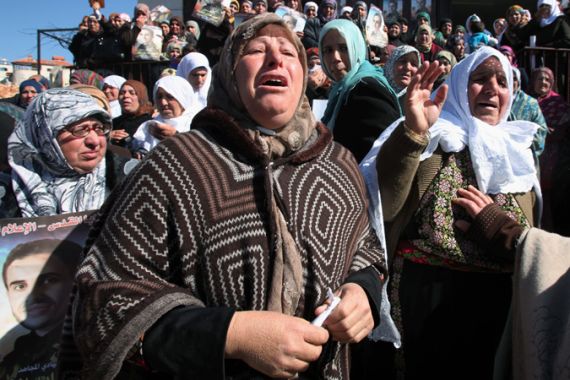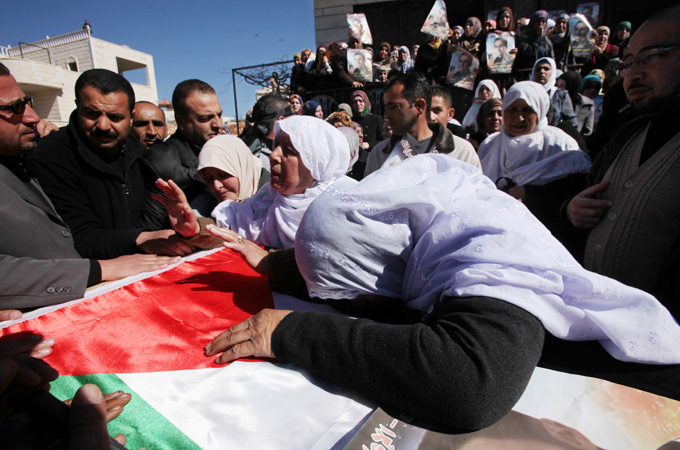The politics of returning Palestinian remains
Israel accused of withholding remains of Palestinians killed in attacks for political purposes.

Dura, Occupied West Bank – The remains of Palestinians killed while attacking Israelis are being returned to families, bringing closure to some in the occupied territories while dredging up painful memories in Israel.
Nabila Faqih and her husband Ayed from the town of Dura in the southern West Bank recently received the remains of their son, Ahmed, who was killed during an attack on a nearby Jewish settlement in 2002.
Ahmed Faqih was a member of the Palestinian group Islamic Jihad and his remains had been kept buried by Israeli military authorities in the so-called “cemetery of numbers” in the Jordan Valley.
“It is a haunting nightmare that has ended,” Nabila Faqih told Al Jazeera. “I don’t know why the Israelis kept tormenting us for 12 years.”
For 12 years we were tormented like no one would imagine. Now I hope we can resume our normal life. May he rest in peace.
Israel has stepped up the release of remains of Palestinians killed in attacks against Israeli targets. The process has been underway since the conclusion of the Oslo Accords between the Palestine Liberation Organization and the Jewish state more than 20 years ago.
Some of the withheld remains include those of suicide bombers such as Ayat al-Akhras, an 18-year-old woman who killed herself and two Israeli civilians – including 17-year-old Rachel Levy – in 2002 by detonating explosives belted to her body. Akhras’ remains were released earlier this month to her family in Bethlehem.
Returning the remains of Palestinian assailants has angered some Israelis. “Those who killed civilians should be treated like people who committed war crimes,” said Meir Indor from the group Almagor, which speaks for victims of attacks.
Almagor said Levy’s parents were disturbed when they learned Akhras’ remains had been returned to the West Bank.
Emotional issue
Observers say the release of the remains, partly taken under US pressure, is intended to shore up support for Palestinian leader Mahmoud Abbas, while encouraging stalled peace talks with Israel.
Palestinians being returned by Israel, whether dead or alive, is a strong emotional issue in the occupied territories.
The Israeli army handed over Ahmed Faqih’s remains to his family, and a ceremony was held on February 10 at Dura’s Cultural Center with his photos decorating the room, along with portraits of deceased leaders and symbols of the Palestinian struggle, including late PLO leader Yasser Arafat.
The arrival of the “martyr’s remains” was greeted with fire-crackers, patriotic songs and a plethora of speeches by local officials. Messages of solidarity from the PLO leadership were recited as hundreds of people looked on.
At the family home two blocks away, dozens of women ululated as Faqih’s remains arrived.
“For 12 years we were tormented like no one would imagine. Now I hope we can resume our normal life. May he rest in peace,” said Nabila Faqih. “Just imagine your son buried in a distant land, away from us, and held for 12 years in an anonymous grave for political bargaining.”
 |
| Palestinian family members mourn Ahmed Faqih’s coffin [EPA] |
Bringing back the dead
Salem Khilla is in charge of bringing home the remains of Palestinians held by Israel. He said while the recent releases were a step in the right direction, there was still much more to do.
“No, no this file is not going to be closed with the release of the remains of a few martyrs. In fact, I can tell you the file will remain wide open for many months and years to come,” he said.
Khilla said Israel was still holding the remains 152 Palestinians and is “always coming up with pretexts and excuses to delay their release or even evade the entire issue”.
“We have made tremendous political, diplomatic and legal efforts to get Israel to release the remains of dozens of martyrs. But Israel is complicating the matter by claiming that many of the remains yet to be handed over have not been positively identified. This is an arduous and painstaking task. And it takes a lot of time.”
Khilla accused Israel of exerting “political and psychological pressure” on the Palestinian leadership.
“Israel is portraying the release of these remains as an expression of magnanimity and generosity on her part. But as one who has been following this subject for years, I have no doubt that Israel is using this sensitive issue as a bargaining chip to bully and blackmail the Palestinian side to give certain concessions to Israel.”
Other than the remains, Khilla said there are 65 Palestinian fighters whose fate is not known and who are feared dead. The figure includes Ali Abu Maliha, also from Dura, who went missing during a shootout with Israeli troops in 1969. His family has never heard from him since. Israel denies it is holding his remains or those of the 64 others.
‘Glorification of terrorism’
Israeli spokespeople refused to comment on allegations that the country was delaying the return of remains for political purposes.
The PA must stop the anti-Semitic incitement and glorification of terrorism it is practicing in its schools and media.
Instead, Prime Minister’s Office spokesman Ofir Gendelman said Israel expected the Palestinian Authority to take concrete steps to prove it is sincere about the peace process.
“The PA must stop the anti-Semitic incitement and glorification of terrorism it is practicing in its schools and media,” said Gendelman.
“The PA must also tell its people that it will make tough choices for peace: that the descendants of Palestinian refugees will not be resettled in Israel, and that it recognises the Jewish people’s homeland, which is the state of Israel.”
Wasel Yousuf, a high-ranking PLO official, reacted angrily to the comments, saying Israel was the main source of terrorism in the Middle East.
“They stole our homeland, murdered our children, bulldozed our villages and dispersed us all over the globe, and now they are calling us terrorists. This is beyond the pale,” Yousuf said.
Palestinians reject any notion of giving up the right of return for Palestinian refugees who fled or were forced to flee their homes after the Jewish state was created in 1948. Some PLO leaders have said a just resolution of the refugee problem is even more paramount than the creation of a Palestinian state.